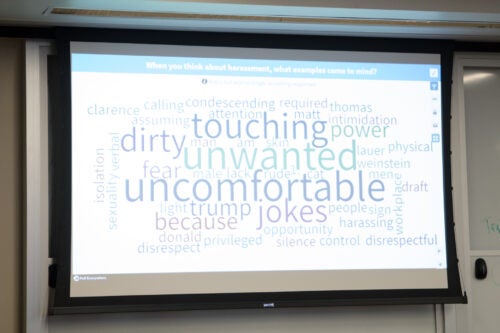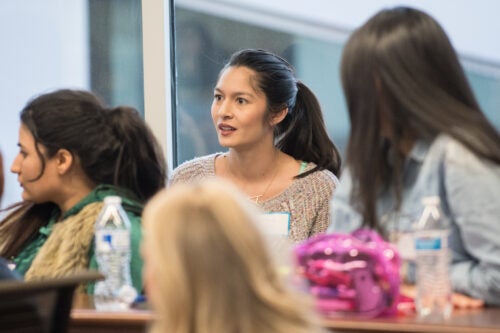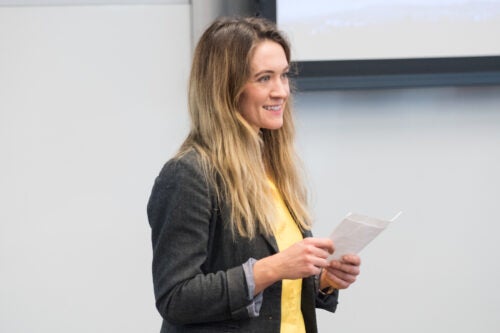
Lots of ideas came out of a recent meeting when about 50 students and several faculty members met to talk about recognizing and ending harassment in the workplace. Among those ideas: Setting appropriate norms, modeling good behavior, calling out bad behavior, and above all, keeping the conversation going.
Student groups Women of the Workplace, the Student Nurses’ Association and the Pre-Law Society hosted the talk, “Creating a Collaborate Climate in an Evolving Workplace,” which took place Jan. 31 in the Micron Business and Economics Building. It included breakout sessions and instantaneous text polls, including one that asked: “When you think about harassment, what examples come to mind?” The poll stirred answers like “unwanted,” “uncomfortable,” “touching.” The mix included a few high-profile names, including “Trump,” “Weinstein” and “Lauer.”

Idaho State Rep. Melissa Wintrow, who has deep roots at Boise State as the former head of the Women’s Center (now the Gender Equity Center), facilitated the discussion. Wintrow began by asking students to stand if they had experienced or observed slights like cat calls, inappropriate jokes, the objectification of body parts or “man-splaining.” That’s a pop culture term for someone, generally a man, explaining something to someone, generally a woman, in a condescending way. For some in the room, it was the first time hearing that term.
But for most of the time, most of the room was standing.
Amanda Haines, a senior majoring in political science and treasurer for the Pre-Law Society, was pleased the topic of workplace harassment is getting its due on campus and that so many students were engaged in the conversation. The subject matter isn’t easy. She is wary, she said, of the temptation to designate “good men” and “bad men”— men who would never harass women at work, and men who would. Real-life situations are more nuanced, said Haines.

“We have to stop making the paradigm of good and bad people and start looking at the deep complexity of humans”— and a culture in which unacceptable behavior becomes normalized, she said.
Wintrow co-chairs the National Network of State Legislators Committed to Civil Governance. The group supports efforts to revive civility. During Wednesday’s breakout sessions when attendees divided into small groups for discussion, Wintrow urged attendees to listen to one another — not with the purpose of forming a better argument, but for deeper understanding.
Shelle Poole, faculty advisor for Women of the Workplace and an assistant professor in the Department of Management, wanted the discussion to remain positive and productive.
“I think one thing I was particularly impressed with was, there was a group where two of the members had completely opposite perspectives. They stayed respectful of one another, asked each other tough questions, and listened to each other’s perspectives,” said Poole. “Because of this they learned something in the process. ”
As for what comes next, “This is the first of many conversations,” said Lauren Rice, one of the group of students that founded W.O.W. Rice will graduate this spring with her Master of Business Administration.
Open discussions on campus can help make a daunting issue like ending harassment digestible and actionable, Rice said. “We want students to know that they can be change agents.
“We want to give students concrete ideas that they can take with them, whether that’s to club meetings, Greek meetings, or their residence halls,” she said.

Wintrow echoed the sentiment and challenged students and faculty.
“How will you act in your sphere of influence? Because we all have them,” she said.
W.O.W. is actively recruiting members. The group is primarily for women, though men participate in some programs. W.O.W. members will offer information about their group at the upcoming “Careers You Can Bank On” event where students can learn more about career opportunities in the banking industry. All majors are welcome. The event is from 4:30-6:30 p.m. Wednesday, Feb. 28, in Skaggs Hall, MBEB 1301.